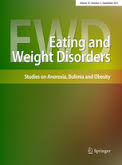 Calugi, S., Sartirana, M., Milanese, C., El Ghoch, M., Riolfi, F., & Dalle Grave, R. (2018). The clinical impairment assessment questionnaire: Validation in Italian patients with eating disorders. Eating and Weight Disorders. doi:10.1007/s40519-018-0477-2
Calugi, S., Sartirana, M., Milanese, C., El Ghoch, M., Riolfi, F., & Dalle Grave, R. (2018). The clinical impairment assessment questionnaire: Validation in Italian patients with eating disorders. Eating and Weight Disorders. doi:10.1007/s40519-018-0477-2
To read the article click here
BACKGROUND: The Clinical Impairment Assessment (CIA) is a measure of functional impairment secondary to eating disorder symptoms. AIM: The aim of this study was to examine the psychometric proprieties of the Italian-language version of the CIA.
METHODS: The tool was translated into Italian and administered to 259 Italian-speaking in- and outpatients with eating disorders and 102 healthy controls. The clinical group also completed the Eating Disorder Examination Questionnaire (EDE-Q) and the Brief Symptom Inventory (BSI).
RESULTS: Confirmatory factor analysis revealed a good fit for the original three-factor structure. Internal consistency was high for both the global CIA and all subscale scores, and test-retest reliability was acceptable. The high correlation between CIA and EDE-Q and BSI confirmed the convergent validity of the instrument. T test indicated higher raw scores on CIA in patients with eating disorders than healthy controls, and a cut-off score of 16 on the CIA discriminated between eating disorder and general psychopathology scores. Finally, global CIA and subscale scores were significantly higher in patients who reported objective bulimic episodes, purging behaviours, and excessive exercising than in those who did not; in underweight than in not-underweight patients, and in inpatients than outpatients, confirming the good known-groups validity of the tool.
CONCLUSIONS: Overall, the study showed the good psychometric properties of the Italian version of the CIA, and validated its use in Italian-speaking eating disorder patients.
LEVEL OF EVIDENCE: Level V, Descriptive study.
KEYWORDS: Eating disorder; Factor structure; Functional impairment; Psychometric characteristics; Validity
PMID: 29368290





